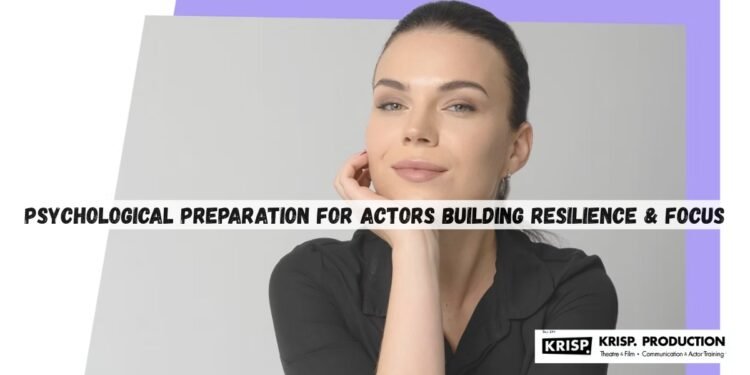If you’ve ever felt emotionally drained after an audition or struggled to bounce back from rejection, you already understand why actor resilience in Singapore is a survival skill. Between tight deadlines, competitive castings, and the mental toll of becoming someone else on stage, many actors battle burnout behind the scenes.
We get it, because at KrispProduction, we’ve coached hundreds of performers through these same challenges. Our team helps actors find balance through focused training, emotional awareness, and proven techniques that strengthen both craft and confidence.
In this article, we’ll share practical ways to rebuild your mental stamina and stay grounded in a demanding industry. Here’s what we’ll cover:
- What actor resilience really means and why it matters
- How sport psychology supports mental focus and recovery
- Everyday ways to build resilience and stay well
Take a deep breath, grab your notebook, and let’s strengthen your mindset together.
What Is Actor Resilience?
Actor resilience means the mental strength to handle rejection, performance pressure, and emotional demands while sustaining a long career in a competitive entertainment industry.
Let’s be honest here, the acting profession in Singapore isn’t for the faint-hearted. You’re constantly juggling auditions that lead nowhere, dealing with mental health pressures that sneak up on you, and pushing through demanding roles that leave you emotionally drained.
And it’s not just a local thing. Actors across the world face these same struggles every day, but Singapore’s fast-paced entertainment world adds its own flavor of intensity.
This is why you need psychological skills. They’re the difference between burning out after a few years and actually building something that lasts. When you develop these mental tools, you’re setting yourself up for a long, sustainable career.
Why Do Actors Need Psychological Skills?
The best part about developing psychological skills is that they protect your mental health, extend your career, and help you recover faster from setbacks. And the same goes for actors in Singapore’s demanding entertainment scene. Even experienced performers struggle without these tools.

Let’s know the major reasons why these skills aren’t optional anymore:
Post Performance Mental Recovery
Ever finish an emotionally draining scene and feel like you can’t shake the character for days afterward? Well, you’re not alone, and no, talking to yourself in character at the grocery store isn’t normal.
After intense scenes, actors often carry stress, anxiety, and even depression home with them. That’s why learning to let go is essential for protecting your well-being long term.
Without psychological skills to process these emotions, you risk burning out before your career even gets going. And trust us, your family doesn’t want to live with King Lear during dinner.
Identity Boundaries
Setting identity boundaries is the fastest way to prevent losing yourself in roles and maintain a healthy sense of who you are offstage. The person you are and the character you play need separation.
Unless you want to explain to your partner why you’re still crying about something that happened to a fictional character three weeks ago.
One way to do this is by keeping rituals that remind you of your real life, like calling friends after rehearsals or having hobbies outside the theater.
Pro Tip: Keep your head clear by setting firm boundaries between your personal life and the roles you take on.
Managing Stage Fright
Stage anxiety affects even seasoned actors, with physical symptoms like a racing heart, sweating, and mental blanks that sabotage your performance. The result is real pain that chips away at your confidence and focus.
When you’re standing backstage with your heart pounding and convincing yourself you’ll forget every line, you become your own worst enemy. Then, performance nerves trigger negative self-talk that undermines all your preparation and skills.
However, learning to manage this fear means you can deliver consistent work in front of crowds, night after night.
Now that you understand why psychological skills matter, let’s look at where actors can actually learn these techniques.
How Can Sport Psychology Help Actors Build Resilience?
The term sport psychology refers to psychological training techniques like mental rehearsal, positive self-talk, and pre-performance routines that help athletes perform under pressure.

But what connects sports persons and actors?
Surprisingly, both face similar challenges: performing under scrutiny, bouncing back from failure, and maintaining focus when the stakes run high. If athletes get results from these sport psychology methods, artists can succeed with them too.
Follow these three proven techniques to train your mind like an athlete:
- Mental Rehearsal Techniques
According to Stanford University research, mental rehearsal means visualizing success before you actually perform. It reduces anxiety and builds muscle memory without physical effort. That’s why many sports psychology services teach athletes and actors development strategies to master this technique.
How to Rehearse It: You close your eyes and run through your entire scene, picturing yourself nailing every line, hitting every mark, and connecting with your scene partner.
This technique strengthens the same neural pathways you use during performance. After several repetitions, your brain can’t fully distinguish between a vivid mental rehearsal and the real thing.
- Positive Self Talk
What do you tell yourself after a bad audition or when a director criticizes your work? Probably something like “I’m not good enough” or “I’ll never make it”, right?
We understand the disappointment that comes with rejection, but true growth happens when you keep moving forward.
Athletes act confidently by using positive affirmations instead of dwelling on what went wrong. The difference between saying “I’m terrible” and “That didn’t work, but I’ll adjust” might seem small, but it changes how you approach the next opportunity. You start viewing challenges as chances to refine your skills.
Based on our experience, talking kindly to yourself builds mental strength over time and protects the joy that brought you to acting in the first place.
- Pre-Performance Routines
Pre-performance routines are the easiest way to calm nerves, signal your brain it’s showtime, and deliver consistent quality night after night. Think about what athletes do before competing. They do rigorous practices that get them in the zone, and actors need the same thing.
One actor we know does a range of warm-ups before every show. Preparing with dedicated sessions becomes second nature to him. He does vocal exercises, listens to the same playlist, then stretches for exactly ten minutes.
Sounds rigid, right?
But here’s the thing: the routine grounds him. When he finishes that last stretch, his brain knows it’s time to focus. The reason this works is your body starts associating these activities with performance mode, so you get ready faster and more reliably each time.
What Are Practical Ways to Strengthen Mental Resilience and Well-Being?
The most practical ways to build mental resilience start with honest self-reflection and small, steady routines that strengthen your emotional muscles. Try these:
- Take Mental Notes: After each performance, jot down what worked, what drained you, and how you handled stress. These personal check-ins help you notice patterns before burnout sneaks in.
- Join the local community: You can join local community workshops or acting circles around Singapore. These gatherings remind you that growth happens in shared spaces, not isolation. When you train with others, your resilience grows faster than rehearsing alone in your bedroom mirror.
Another underrated way to stay balanced is sharing stories with family or partners who genuinely understand your journey. Their outside perspective often helps you reset after a tough scene or rough audition.
Friendly Reminder: Visit studios, connect with fellow adults who share your goals, and remind yourself that well-being is a shared practice.
Building Strength That Lasts
Acting takes talent along with emotional stamina. The pressure of auditions, long rehearsals, and constant self-comparison can weigh heavily, but with the right mindset and psychological skills, your focus and balance can stay steady through any season.
We explored how resilience helps actors stay grounded, how sport psychology improves mental focus, and how small daily habits strengthen long-term well-being. Now you know that lasting success starts with caring for your mind as much as your skill.
Our team will guide you through every step of this journey. Your growth, confidence, and resilience will continue to build with every performance you give.


































